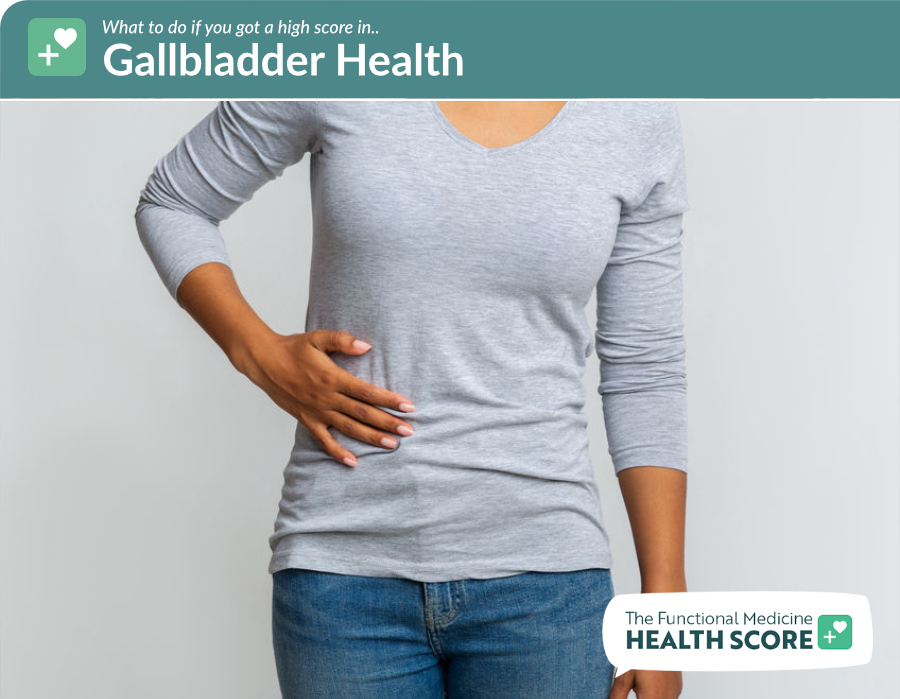This page is designed to help you understand why you might be experiencing symptoms relating to poor gallbladder health.
In this section we look at what the gallbladder is, symptoms of dysfunction, what gallstones are and how they might form, then dietary and natural considerations to support gallbladder health.
What is the gallbladder and what is its function?
The gallbladder is a pear-shaped organ that sits under the liver on the right side of the abdomen. The gallbladder stores bile, fluids, fat and cholesterol. The gallbladder also acts as a reservoir for bile when we are not digesting foods, therefore a storage centre for bile acid awaiting release when we consume foods, particularly fatty foods.
One of its main functions is to excrete bile into the small intestine where it helps to breakdown fats from the foods that you consume. This also assists in the absorption of fat-soluble vitamins as well, such as vitamins A, D, E and K.
Bile acids also play a role in maintaining a healthy balance of bugs in our gut, and low levels of bile acid have been implicated in the development of small intestine bacterial overgrowth (SIBO).
In addition to supporting digestion and microbiome balance, it also drains waste products from the liver into the small intestine, so is therefore an important part of detoxification.
What are the symptoms of a gallbladder issue?
Gallbladder issues can cause a number of symptoms, some more chronic and subtle and others much more acute and painful.
More acute symptoms can include pain that comes on suddenly in the gallbladder area that intensifies quickly. These pains can also refer through to the upper right side of the back as well. Often these more acute pains will occur following a meal or in the evening.
Other more acute symptoms include fever, nausea and vomiting. If you are experiencing these types of acute symptoms you should be contacting your Doctor for investigation into the cause. This can help to rule out issues such as gallstones, cholecystitis (inflammation of the gallbladder) often caused by gallstones, infections, gallbladder polyps and blockages of the bile ducts etc.
More subtle and often chronic symptoms of gallbladder dysfunction include symptoms more associated with poor fat absorption, for obvious reasons knowing its role in the digestion of fats. Some of these symptoms include:
- Dry / flaky / itchy skin
- Yellowing of the eyes and/or surrounding areas
- Intolerance to higher fat meals, sometimes causing nausea, digestive upset or vomiting
- Pale or clay-coloured stools. Potentially stools that appear greasy or float
- Upper digestive symptoms such as bloating, gas, reflux
- Changeable bowel movements
- Very dark urine
What are gallstones?
Around 5-22% of the western world have gallstones. Gallstones can be a particular health concern, not just because of the immediate symptoms that they can create, but because of the link with an increase mortality due to cardiovascular disease and gallbladder cancer.
An excess of cholesterol, bile salts or bilirubin (a waste product from red blood cell breakdown) can lead to gallstones. Gallstones can be categorised into four main groups:
- Pure cholesterol
- Mix of cholesterol, bile salts, salts of calcium and bile pigments
- Stones made up of minerals only
- Calcium bilirubinate
The large majority of stones are of the mixed variety and form as a result of increased bile and cholesterol concentration in the gallbladder, then the formation of very small solid masses collide and combine to make larger stones. This process can take years before acute symptoms are experienced.
Some of the main risk factors for the development of gallstones
- Being overweight or obese and consuming a high calorie diet
- Dramatic weight loss, severe calorie restriction
- Age – Particularly being over 60
- Gender – tends to occur more in females (2-4 x greater risk)
- Excess oestrogen
- Certain medications – Tamoxifen for example, a drug used in the treatment of breast cancer is linked with a higher incidence of gallstone formation
- Dietary habits – low fibre, high fat and high refined carb diet
- Gastrointestinal diseases such as Crohn’s
Testing considerations for gallbladder health and gallbladder removal considerations
If you are experiencing symptoms associated to gallbladder issues and potentially gallstones, this must be investigated by your Doctor. Usually an ultrasound or abdominal CT scan may be used to diagnose gallstones, or some form of gallbladder disease.
In blood work you can pick up on possible gallbladder issues by looking for elevations in the following blood-markers:
- Bilirubin
- GGT ALT
- AST
- Serum Bile Acids
- Cholesterol
Of course, blood tests like this need to be looked at in context with symptoms.
In some instances, the gallbladder may be removed, typically when there is painful gallstones, blockages or inflammation.
You can still live normally following the removal of the gallbladder; however, it may make it more challenging to process meals containing higher levels of fats. The liver continues to make bile acids, however the bile acids cannot be stored and then secreted in bolus amounts like it would be when the gallbladder is present and functioning properly.
If you have had your gallbladder removed there may be some specific dietary and supplement recommendations that will help to avoid chronic or acute issues associated with the removal of the gallbladder. Unfortunately, following gallbladder removal, very little advice is provided in relation to dietary changes or supplementation to support fat digestion. Therefore, many people struggle with symptoms, particularly in the months that follow the procedure.
Nutrition & Lifestyle considerations for Gallbladder Health
Nutrition
Nutrition can play a significant role in the prevention of gallbladder issues and also the management or pre-existing issues.
Below are some nutrition recommendations associated with a lower risk of gallbladder conditions such as gallstones.
- Increase fibre in your diet
- Avoid significantly fat restricted diets
- Consume healthier fats as part of a balanced diet
- Avoid a diet dominated by refined carbohydrates and fats
- Use coffee wisely – coffee can aggravate symptoms of gallstones, however it can at the same time help to prevent gallstone formation
- Eating an anti-inflammatory diet – traditional Mediterranean style diet
Exercise & Body Composition
Obesity, type 2 diabetes, high triglyceride levels and therefore insulin resistance have been linked with an increased risk for gallstones. Therefore, maintaining a healthy body composition has been shown to lower the risk for gallstones and gallbladder issues.
If you do need to lose weight, it is best done in a gradual manner avoiding crash diets very low in fats. It should be noted that when reducing body fat levels this can promote gallstone problems. I have personally seen a few clients that had to have their gallbladder removed after following a very low calorie and fat restricted diet. If a diet is dropping as low as 10-20grams of fat in a day, this may prevent the gallbladder from emptying properly.
We specialise in supporting clients with weight loss and body composition goals, making lifelong changes in their behaviours and habits and therefore creating lasting body composition results.
A sedentary lifestyle is another independent risk factor for gallstone formation, therefore making time in your day for exercise will both support gallbladder health, promote a healthier body composition and also promote better physical and mental health in general.
Nutrients and Herbs
Certain nutrients and herbs may have a beneficial impact on gallbladder health. Below are a few options that may help to support someone with mild gallbladder symptoms that do not require medical intervention:
Milk thistle, Artichoke and Turmeric – These may help to promote bile flow and reduce the chances of bile stone formation.
Fish Oil – May help to reduce gallstone formation through increased solubility of cholesterol. Studies have shown this to be particularly beneficial in those losing weight. Thus fish oil supplementation can be a good companion for those on a significant weight loss journey.
Vitamin E and Vitamin C – Low levels of these nutrients are linked with gallstones.
Magnesium – Can be helpful in reducing gallbladder spasms, supporting the emptying of the gallbladder and also decrease the risk of formation.
Liver or Gallbladder Flushes
For years I have heard about people talking about doing a liver or gallbladder flush using olive oil and lemon or apple juice. During the flush these people report passing huge stones. THESE ARE NOT GALLSTONES!!! These semi green solid stones result from a reaction between the olive oil, juice and gastric lipases (fat digesting enzymes) forming these masses in the bowel to then be excreted.
Unfortunately, the myth of the gallbladder flush continues, and rather than helping gallbladder health, it actually has the potential to have negative effects on the health of the gallbladder, particularly for those with pre-existing gallbladder issues.

1-2-1 Support
I hope you have found this content useful. If you feel that you could benefit from additional support in this area, don’t hesitate to get in touch using the enquiry form below.
[widgetkit id=”643″]
















